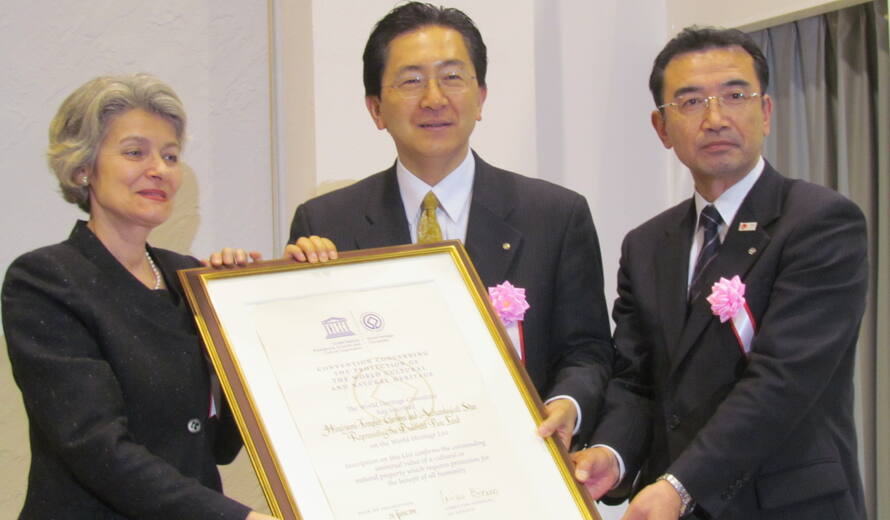Heritage Heals in Hiraizumi
It is rare for a Director-General to present a certificate of World Heritage in person, but the temples, gardens and archaeological site of Hiraizumi, inscribed on the List in 2011, marked an exception.
Located in north-east Japan, the 12th-century site, representing the Buddhist Pure Land gained its world heritage status three months after the earthquake and tsunami devastated the surrounding region.
“I am here to show solidarity with the people of Japan, especially here, where you were so hard hit by the tsunami and earthquake,” said UNESCO’s Director-General Irina Bokova, during a ceremony and press conference held at Hiraizumi’s Cultural Heritage Centre on 13 February 2012. “I am also here to thank Japan that has always been ready to assist all those in need….The serenity of the temples and gardens of Hiraizumi stands in poignant contrast with the deep wounds of a region hit hard by the earthquake of 11 March 2011.”
During the ceremony, Mrs Bokova gave the World Heritage site certificate to Mr Takuya Tasso, Governor of Iwate Prefecture and Mr Masayoshi Sugawara, Mayor of Hiraizumi. Both referred to the designation as “a great encouragement for all the people living in the disaster areas.”
A further source of pride for the people of Hiraizumi was the launch, the same day, of the 40th anniversary of the World Heritage Convention in Japan in their town. “World heritage is an idea that brings us together. It is a simple idea, but a revolutionary one,” said Mrs Bokova. “Today our greatest challenge is no longer only to save temples,” referring to the Abu Simbel operation in Egypt in the early 1960s. “It is to respond to the pressures of climate change, rapid urbanization, mass tourism and natural disasters. … It is up to us to find the best way for each heritage site to ensure its protection and to make the most of it as a source of solidarity, inclusion and progress.”
She praised Japan for championing the success of the World Heritage Convention, referring to projects it finances through UNESCO-Japanese Funds-in-Trust in 25 countries. Japan counts 16 World Heritage sites, of which 12 are cultural and 4 natural.
The launching ceremony was followed by a panel discussion on cultural heritage and disaster management.

